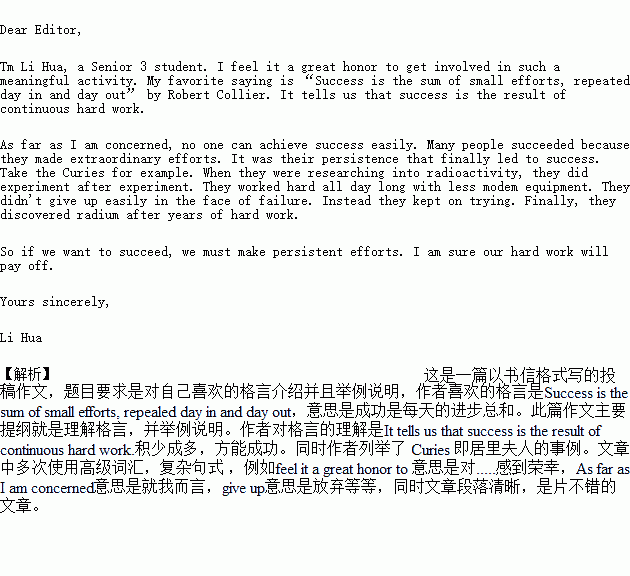题目内容
某英语杂志正在举办“分享我的格言”的活动,你最喜欢的英语格言是Robert Collier的“Success is the sum of small efforts, repealed day in and day out”。请根据下面的写作提示写一篇投稿,内容包括:
1.你如何理解这句格言;
2 .举例说明你的观点。
注意:词数100左右。
Dear Editor,
I'm Li Hua, a Senior 3 student. I feel it a great honor to get involved in such a meaningful activity.
____________________________________________________________________________________________
____________________________________________________________________________________________
____________________________________________________________________________________________
____________________________________________________________________________________________
____________________________________________________________________________________________
__________________________________________________________________
Yours sincerely,
Li Hua
| A. | speeding up | B. | to speed up | C. | having sped up | D. | speed up |
-Sure.______.( )
| A. | I did | B. | I do | C. | I shall | D. | I will |
The research,conducted by St.George University,shows that different parents have different(6)approaches to these problems.However,some approaches are more (7)successful than others.For example,those parents who yell at their children for their untidiness,but(8)later clean the room for them,have fewer chances of changing their children's(9)behavior.On the contrary,those who let teenagers experience the(10)consequences of their actions can do better.For example,when teenagers who don't help their parents with the shopping don't find their favorite drink in the refrigerator,they are forced to(11)reconsider their actions.
Psychologists say that (12)communication is the most important thing in parent-child relationships.Parents should (13)talkto their children but at the same time they should lend an ear to what they have to say.Parents may(14)scold their children when they are untidy but they should also understand that their room is their own private space.Communication is a two-way process.It is only by listening to and(15)understanding each other that problems between parents and children can be settled.
| 1.A.natural | B.strong | C.guilty | D.similar |
| 2.A.interest | B.argument | C.link | D.knowledge |
| 3.A.noisy | B.crowded | C.messy | D.locked |
| 4.A.homework | B.housework | C.problem | D.research |
| 5.A.washing | B.using | C.dropping | D.replacing |
| 6.A.approaches | B.contributions | C.introductions | D.attitudes |
| 7.A.complex | B.popular | C.scientific | D.successful |
| 8.A.later | B.deliberately | C.seldom | D.thoroughly |
| 9.A.behavior | B.taste | C.future | D.nature |
| 10.A.failures | B.changes | C.consequences | D.thrills |
| 11.A.defend | B.delay | C.repeat | D.reconsider |
| 12.A.communication | B.bond | C.friendship | D.trust |
| 13.A.reply | B.attend | C.attach | D.talk |
| 14.A.hate | B.scold | C.frighten | D.stop |
| 15.A.loving | B.observing | C.understanding | D.praising. |
Most people learn best using a variety of (40)methods,but traditional classes are an ideal(理想的)start for many people.They (41)provide an environment where you can practice under the (42)guidance of someone who's good at the language.We all lead (43)busy lives and learning a language takes(44)time.You will have more success if you study regularly,so try to develop a (45)routine.It doesn't matter if you haven't got long.Becoming fluent in a language will take years,but learning to get by takes(46)alotless.
Many people start learning a language and soon give up."I'm too (47)old,"they say.Yes,children do learn languages more (48)quickly than adults,but research has shown that you can learn a language at any (49)age.And learning is good for the health of your brain,too.I've also heard people (50)worry about the mistakes they make when (51)learning.Well,relax and laugh about your mistakes (52)and you're much less likely to make them again.
Learning a new language is never (53)easy.But with some work and devotion,you'll make progress.And you'll be (54)amazed by the positive reaction of some people when you say just a few words in (55)their own language.Good luck!
| 36.A.technical | B.political | C.practical | D.physical |
| 37.A.After | B.So | C.Though | D.Or |
| 38.A literature | B.transport | C.agriculture | D.medicine |
| 39.A view | B.knowledge | C.form | D.database |
| 40.A paintings | B.regulations | C.methods | D.computers |
| 41.A.protect | B.change | C.respect | D.provide |
| 42.A.control | B.command | C.guidance | D.pressure |
| 43.A.busy | B.happy | C.simple | D.normal |
| 44.A.courage | B.time | C.energy | D.place |
| 45.A.theory | B.business | C.routine | D.project |
| 46.A.some risks | B.a lot less | C.some notes | D.a lot more |
| 47.A.old | B.nervous | C.weak | D.tired |
| 48.A.closely | B.quickly | C.privately | D.quietly |
| 49.A.age | B.speed | C.distance | D.school |
| 50.A.worry | B.hesitate | C.think | D.quarrel |
| 51.A.singing | B.working | C.bargaining | D.learning |
| 52.A.if | B.and | C.but | D.before |
| 53.A.tiresome | B.hard | C.interesting | D.easy |
| 54.A.blamed | B.amazed | C.interrupted | D.informed |
| 55.A.their | B.his | C.our | D.your. |

